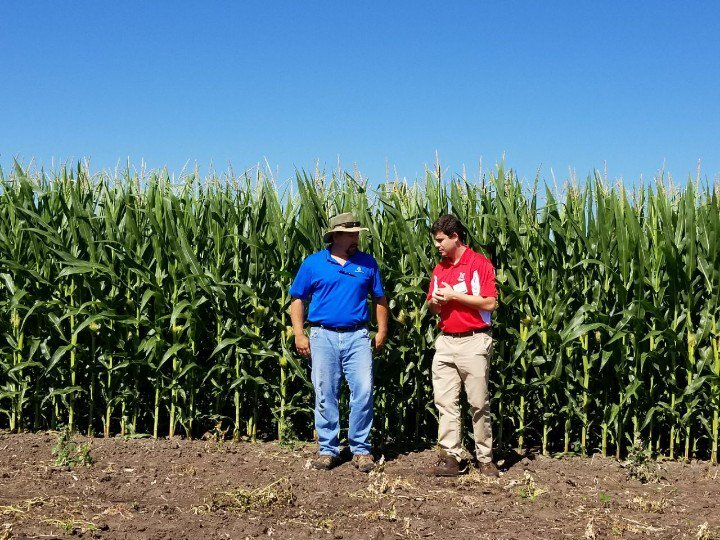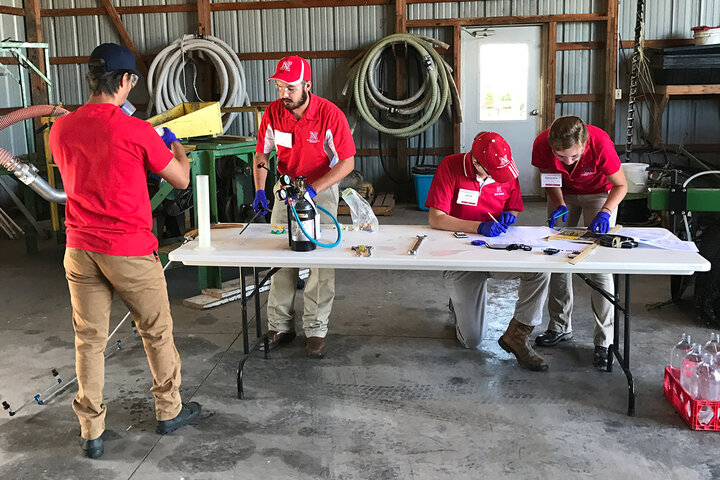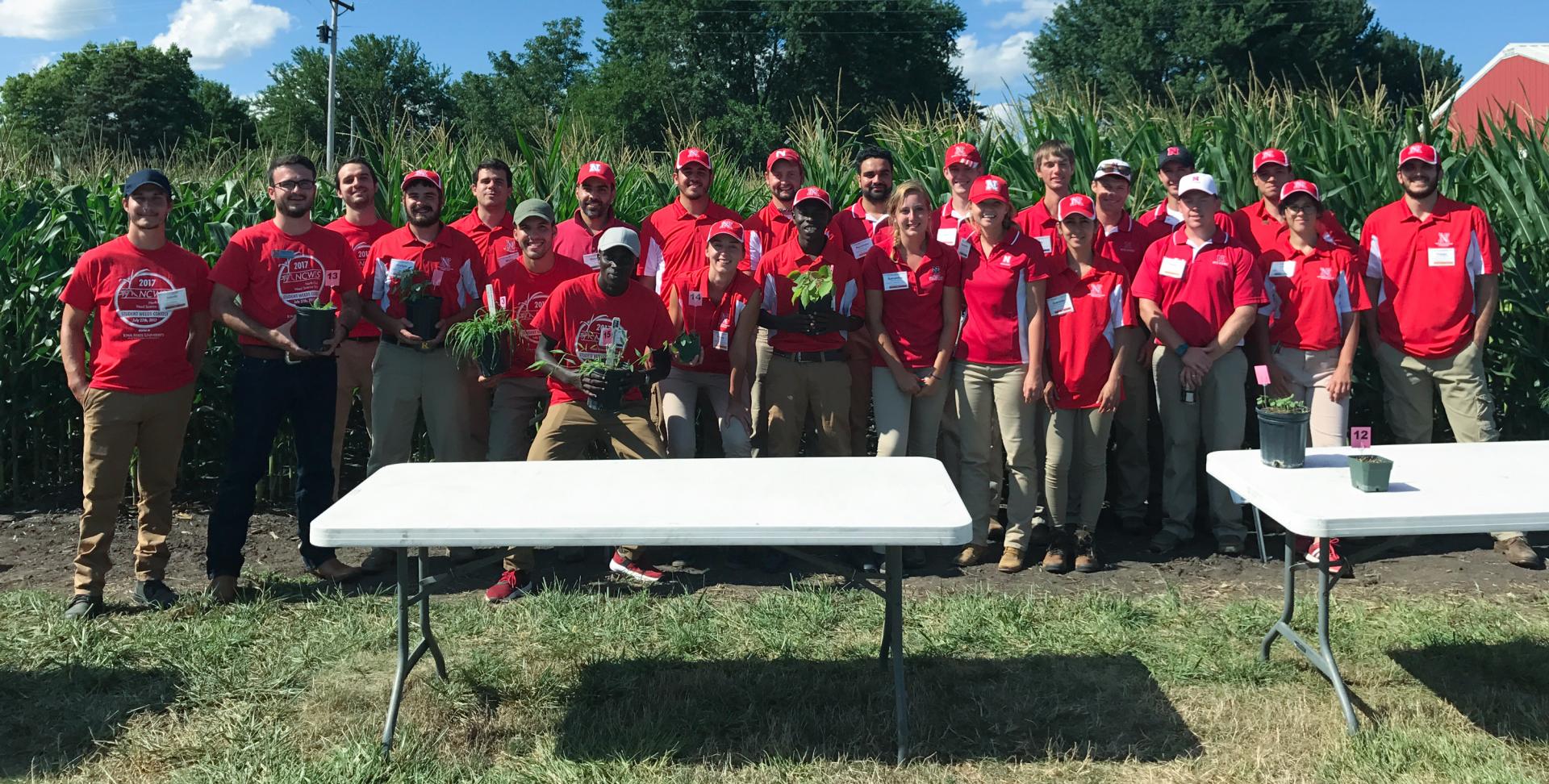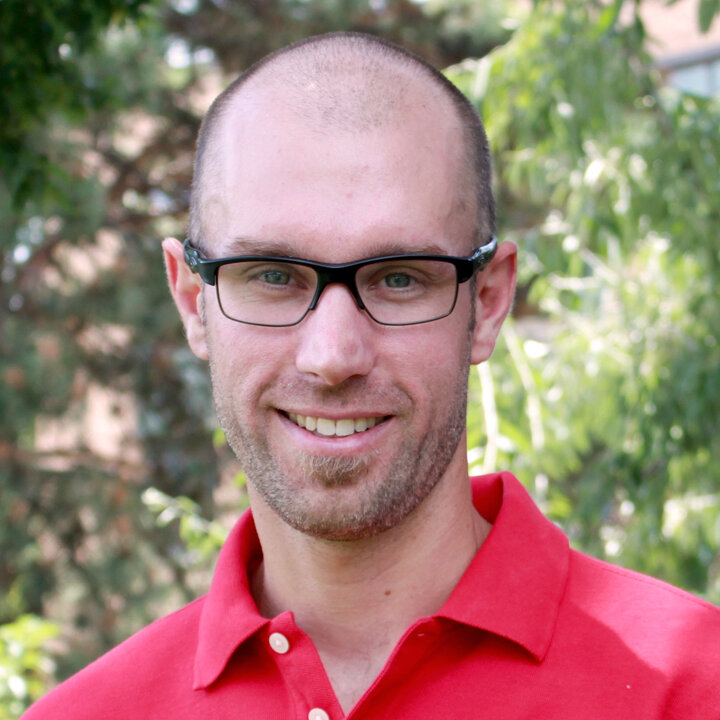Students of the Weed Science Team compete in a contest that is hosted in association with the North Central Weed Science Society (NCWSS annually) and Weed Science Society of America (WSSA every four years for the “Weed Olympics”). All pertinent rules and specifics that will be included in the contest are provided by the host university. There are both undergraduate and graduate-level competition. Contest preparation is offered each spring in the Weed Science Contest Class (AGRO – Independent Study 496/896) where instructors and teaching assistants provide more details about the contest and opportunity to practice your skills.
Interested students should contact Chris Proctor, Associate Extension Educator and team coach at 402-472-5411 or caproctor@unl.edu for more information.

Interested? Join our Team.
Contact Chris Proctor, Associate Extension Educator and team coach at 402-472-5411 or caproctor@unl.edu for more information.
The Weed Science Contest consist of four major events:
- Weed identification: The purpose of this event is for students to demonstrate their competence to identify weeds at all plant life stages. This contest component includes a comprehensive list of about 75 (for regional) and 150 (for national) weed species that students in the class will learn to identify and know by the correct Latin binomial and common name. For the contest, the organizer will select 30 of these species. Contest plants may be grown in either a field or greenhouse, and it may include any stage of growth or development, including seed samples.
- Identification of Unknown Herbicides: The purpose of this event is for students to show their ability to identify herbicide mechanisms of action and active ingredients based on symptomology noticed on treated plants and selectivity among different crop and weed species. The contest organizer will select 30 - 40 active herbicide ingredients (a.i.) from the Master Herbicide List maintained by WSSA or NCWSS. The herbicide identification list will include the a.i., the chemical family, the WSSA mechanism of action (mode of action) name, and WSSA site of action, and the herbicide trade name. In addition, the application timing, the herbicide rate, adjuvants to be used (where applicable), and a list of crops and weeds that may be planted in the herbicide screen will be provided. The contest will have ten to 15 herbicide plots with ten plant and weed species from the provided list.
- Application Technology:
- Written Test on Herbicide Application: The purpose of this event is to assess the individual student's ability to address and perform calculations on related agronomical practices and herbicide application under different scenarios (research plots, ground or aerial applications, and application of pesticides through irrigation system). Typically, a set of questions include and may be related (but are not limited to) sprayer calibration, application volume, load ticket calculations, active ingredient calculations, adjuvant rate, area calculations, metric and English unit conversions, ability to use a pesticide label, nozzle terminology, and selection, sprayer pressure, droplet size, drift or volatility reduction techniques, etc.
- Team Sprayer Calibration: The purpose of this event is to evaluate the expertise of the undergraduate or graduate team's ability to properly calibrate and safely operate with a research (four nozzles) plot sprayer. Each team is provided with a written problem that needs to be calculated during this session, and all application parameters must be applied later on the practical test. Some of the parameters include the student's ability to choose the best application fit for the given scenario to which a CO2 backpack sprayer is going to be calibrated. Each team is expected to select the appropriate nozzle tips, operating pressure, and walking speed for accurate calibration and application to deliver a designated number of gallons/acre or liters/hectare over a given length or area, demonstrating proper sprayer use.
- Problem Solving and Recommendation (aka Farmer's Problem): The purpose of this event is for students to demonstrate their ability to troubleshoot a plant production problem in a field (agronomic, horticulture, turf) or non-crop situation and recommend an effective solution to that problem for the current year as well as how the same problem can be avoided in the future. Recommendations must comply with accepted practices within crops, and all segments should be addressed. Students should consider all factors which influence plant growth and development when making their evaluation.
How do we study for the Weed Science Contest (format and procedures)?

Classes will have both a lecture and a hands-on/discussion component. The main goal of the Weed Science Contest class is meant to be interactive, and therefore participation is highly encouraged. This course is unique in that the participants will also be competing together in the summer competition (if selected). This means that you are all teammates as well as students. Therefore, team building will be emphasized as a goal of the course.
Weed Science Contest Class (AGRO – Independent Study 496/896)
Student Enrollment: The Weed Science Contest Class (AGRO – Independent Study 496/896) is offered annually during the Spring semester. Student enrollment for this class is determined based on whether the student is planning to compete (two credits) or to work on finalizing the Weed Science portion of the program without intention to compete (one credit). Remember, if you choose to take part in the competition, consider that you will represent the University of Nebraska during the summer, so please be prepared to put forth your best effort to be prepared for the competition.
Course Aims and Outcomes: This course aims to provide an educational experience for undergraduate and graduate students interested in Weed Science. Participating in this contest will provide the student with valuable knowledge and recognition for your future career endeavors. In addition to this, the Weeds Science Contest (usually the last week of July) offers additional traveling to another states within NCWSS or WSSA region where students can network with university faculty, researchers, industry representatives, students from other universities, and fellow students. More details in Specific Learning Outcomes. Finally, this contest aims at increasing the visibility of the current and future importance of Weed Science as one of the most limiting factors for the agricultural industry.
Specific Learning Outcomes: By the end of this course, a student will:
- Be able to identify weeds from the list based on seed, seedling, plant part, and/or whole plant samples both by the common name and scientific name.
- Be able to identify unknown herbicides based on crop and weed symptomology or selectivity. The students will understand how different modes of action work in the plant and how this can be used recognition of symptoms based in appearance for both preemergence and postemergence applied herbicides.
- Be able to perform written calibrations and conversions needed in pesticide for both written portion as well as perform sprayer calibration practical portion of the contest.
- Be comfortable introducing themselves to a grower, university faculty, industry representative, and work on identifying and problem-solving.
- Take part in a mock competition (optional) to set the teams for the official competition (usually the last week of July). Teams will be established based on performance after the mock contest but if student would like to get just an experience there is an option to compete as individual. For more information about this reach out to instructor.
NCWSS Weed Science Contests (annual)
- 2022 – Iowa State University (Ames, IA)
- 2021 – North Dakota State University (Fargo, ND)
- 2020 – Postponed until the summer of 2021
- 2018 – Monsanto Company and the University of Nebraska at the Monsanto Water Utilization Learning Center (Gothenburg, NE)
- 2017 – Iowa State University (Boone, IA)
- 2016 – Purdue University (West Lafayette, IN)
WSSA Weed Science Contests ("Weed Olympics")
- 2023 - TBD
- 2019 - BASF Midwest Research Farm, Midwest Ag Research Center of Valent, and Klein Farms (Seymour, IL)
- 2015 - Ohio State University (South Charleston, OH)
- 2011 - University of Tennessee (Knoxville, TN)

